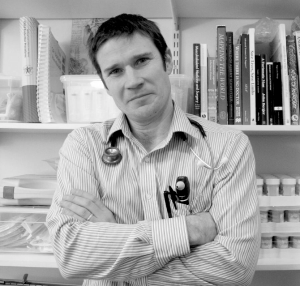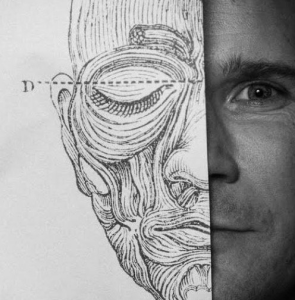Gavin Francis's Adventures in Human Being
04 July 2016
 Prof. David Sowden's summer book review - Gavin Francis's Adventures in Human Being
Prof. David Sowden's summer book review - Gavin Francis's Adventures in Human Being
 Francis’s prologue proves to be enticing, for me at least – his comparison of anatomy to geography had a very strong personal resonance. I too recall identifying the self-same similarity at about 17, as I made my decision to apply for medical school. Indeed that very similarity, and the comfort it offered at a time of uncertainty, was probably a significant tipping point in my final decision – of such small things are built careers and lives. His is the first reference I can recall that makes this linkage, and throughout the book his language echoes some of the insights that resonated with elements of my own career. Though he does so with considerably greater eloquence, and a deal of honesty. For example,
Francis’s prologue proves to be enticing, for me at least – his comparison of anatomy to geography had a very strong personal resonance. I too recall identifying the self-same similarity at about 17, as I made my decision to apply for medical school. Indeed that very similarity, and the comfort it offered at a time of uncertainty, was probably a significant tipping point in my final decision – of such small things are built careers and lives. His is the first reference I can recall that makes this linkage, and throughout the book his language echoes some of the insights that resonated with elements of my own career. Though he does so with considerably greater eloquence, and a deal of honesty. For example,
beginning a clinic can be like setting out on a journey through the landscapes of other people’s lives as well as their bodies…..”I was similarly taken with his comment that “the deepest and most rewarding insights medicine has given me have been from quieter, everyday encounters”. A sentiment that most GPs would echo, and for that matter many senior clinicians, irrespective of their professional tribe. And of course the statement at the end of the prologue that “the practice of medicine is an adventure in human being” is every bit as accurate as it is literally clever.
 From my perspective the book then gets into some trouble. Francis states that the book comprises a series of essays that follow the body from head to toe. It certainly does that and there is no doubting his scholarship and the extent to which he has conducted a wide review of sources to illuminate the text. Not just from science but from the wider (almost exclusively Western) writings over many centuries.
As an exemplar I will leave it to you to read about the anatomical derivation of the word “testify”, but all I can say is that today’s court proceedings would be decidedly more interesting if the historical method of swearing an oath were adhered to.
Trouble is, I was not quite sure, as I read the book, whether these insights and asides really added up to a sufficiently insightful and innovative approach to “human being” to recommend this book to a more professional audience.
I have no doubt that it has value for a less scientifically focused audience as the asides provide a useful distraction from the dissemination of lots of facts and insights that would be of benefit to the wider population that seem so woefully ignorant of almost all aspects of human physiology, anatomy and biochemistry – a testament to the overemphasis on the arts at school and beyond, I would suggest. Francis writes engagingly and most of the time wears his self-evident scholarship lightly – so the learning comes lightly too.
He writes that: “the word ‘lung’ comes from a Germanic root ‘lungen’, which itself arises from another indo-European word meaning ‘light’”; as a background to his statement that the lungs are the least dense organ in the body. I presume the same derivation as the butchery term, seldom used these days, for lungs – also lights, occasionally referred to in the ingredients on a packet of haggis. Really makes you want a Burns’ supper doesn’t it?
From my perspective the book then gets into some trouble. Francis states that the book comprises a series of essays that follow the body from head to toe. It certainly does that and there is no doubting his scholarship and the extent to which he has conducted a wide review of sources to illuminate the text. Not just from science but from the wider (almost exclusively Western) writings over many centuries.
As an exemplar I will leave it to you to read about the anatomical derivation of the word “testify”, but all I can say is that today’s court proceedings would be decidedly more interesting if the historical method of swearing an oath were adhered to.
Trouble is, I was not quite sure, as I read the book, whether these insights and asides really added up to a sufficiently insightful and innovative approach to “human being” to recommend this book to a more professional audience.
I have no doubt that it has value for a less scientifically focused audience as the asides provide a useful distraction from the dissemination of lots of facts and insights that would be of benefit to the wider population that seem so woefully ignorant of almost all aspects of human physiology, anatomy and biochemistry – a testament to the overemphasis on the arts at school and beyond, I would suggest. Francis writes engagingly and most of the time wears his self-evident scholarship lightly – so the learning comes lightly too.
He writes that: “the word ‘lung’ comes from a Germanic root ‘lungen’, which itself arises from another indo-European word meaning ‘light’”; as a background to his statement that the lungs are the least dense organ in the body. I presume the same derivation as the butchery term, seldom used these days, for lungs – also lights, occasionally referred to in the ingredients on a packet of haggis. Really makes you want a Burns’ supper doesn’t it?
 However, as I read further I began to enjoy the diversifications and genuinely interesting insights– the section on the facial nerve via the vicissitudes of Bell’s palsy highlights that sometimes patients opt for abnormality over perceived normality due to the costs associated with the route or destination of normality. Also that time allows patients to make adjustments to disability or acquire acceptance of the same that initially seem impossible or highly improbable. Perhaps something GPs have more opportunity to witness away from the treadmill of hospital practice? Though the current and growing pressures in general practice may be placing this opportunity to view the human condition over time into the past as well. It will be a great loss if that happens – to patients, the public and the clinical professions.
Similarly, the section on the inner ear offered insights into Epley’s manoeuvre that were more than just interesting. Who knew that Epley initially fashioned a simulacrum of the semi-circular canals using hosepipe? Also, I was unaware of the professional hostility to the manoeuvre, largely in America, where many lost a highly lucrative career built on medicating or operating on people with positional vertigo.
There are also little “gems”; it says much of our ancestors that the latin derivation of pudendal (as in the nerve) is prudere – to be ashamed; suggesting a very long history indeed of shame associated with sex and sexual function.
However, as I read further I began to enjoy the diversifications and genuinely interesting insights– the section on the facial nerve via the vicissitudes of Bell’s palsy highlights that sometimes patients opt for abnormality over perceived normality due to the costs associated with the route or destination of normality. Also that time allows patients to make adjustments to disability or acquire acceptance of the same that initially seem impossible or highly improbable. Perhaps something GPs have more opportunity to witness away from the treadmill of hospital practice? Though the current and growing pressures in general practice may be placing this opportunity to view the human condition over time into the past as well. It will be a great loss if that happens – to patients, the public and the clinical professions.
Similarly, the section on the inner ear offered insights into Epley’s manoeuvre that were more than just interesting. Who knew that Epley initially fashioned a simulacrum of the semi-circular canals using hosepipe? Also, I was unaware of the professional hostility to the manoeuvre, largely in America, where many lost a highly lucrative career built on medicating or operating on people with positional vertigo.
There are also little “gems”; it says much of our ancestors that the latin derivation of pudendal (as in the nerve) is prudere – to be ashamed; suggesting a very long history indeed of shame associated with sex and sexual function.
 His last essay on the foot resonated strongly due to the recent flurry of medical negligence cases linked to diabetic Charcot arthropathy of the foot, a complication linked to peripheral neuropathy; a clearly poorly understood condition in general practice and much of hospital practice too. As Francis puts it the foot is a “marvel of engineering”, and that “neglect of the anatomy of the foot is undeserved”. As he reflects it is usually one of the last bits of taught anatomy (is it even taught these days at all??) the last revised and presumably the most easily forgotten.
So, what to make of the book overall?
It isn’t earth-shattering, and its insights are more subtle than dramatic but overall it is a rewarding read. I’ll be honest if you just read the first 2 chapters you may wonder at my assessment but give it time and you to will warm to this book and Francis’s approach. Not a classic book but one that rewards the more persistent professional reader. However, its main value is probably as an addition to the growing library that aids wider understanding of medicine and the human condition faced with disease.
Link to Ted Talk by Gavin Francis on You Tube.
More on Gavin Francis HERE.
Gavin Francis - Adventures in Human Being
Wellcome Collection ISBN 978-1781253427
Prof. David Sowden
MBChB, FRCGP, FRCOG, FFSEM, FAoME, DCH.
Now retired. Formerly : Dean of Post-Graduate Medical Education East Midlands (2000 – 2012) Director of Medical Education England (2008/09 and 2012)
His last essay on the foot resonated strongly due to the recent flurry of medical negligence cases linked to diabetic Charcot arthropathy of the foot, a complication linked to peripheral neuropathy; a clearly poorly understood condition in general practice and much of hospital practice too. As Francis puts it the foot is a “marvel of engineering”, and that “neglect of the anatomy of the foot is undeserved”. As he reflects it is usually one of the last bits of taught anatomy (is it even taught these days at all??) the last revised and presumably the most easily forgotten.
So, what to make of the book overall?
It isn’t earth-shattering, and its insights are more subtle than dramatic but overall it is a rewarding read. I’ll be honest if you just read the first 2 chapters you may wonder at my assessment but give it time and you to will warm to this book and Francis’s approach. Not a classic book but one that rewards the more persistent professional reader. However, its main value is probably as an addition to the growing library that aids wider understanding of medicine and the human condition faced with disease.
Link to Ted Talk by Gavin Francis on You Tube.
More on Gavin Francis HERE.
Gavin Francis - Adventures in Human Being
Wellcome Collection ISBN 978-1781253427
Prof. David Sowden
MBChB, FRCGP, FRCOG, FFSEM, FAoME, DCH.
Now retired. Formerly : Dean of Post-Graduate Medical Education East Midlands (2000 – 2012) Director of Medical Education England (2008/09 and 2012)
